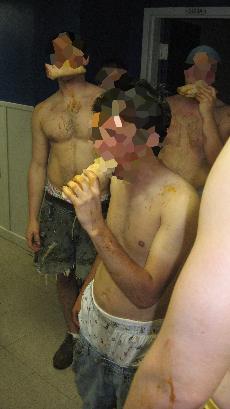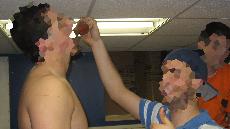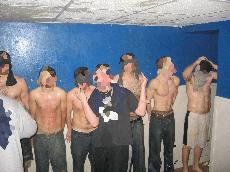Vice President of Student Affairs Linda Clement yesterday called two hazing violations at the university this year isolated incidents and said the university’s current hazing policy needs no changes.
“I don’t really believe that this is a widely recognized practice,” she said. “There are all sorts of stereotypes that exist in the world of the media and the movies, but in general, I really just don’t believe any of that sort of thing is going on here.”
Her comments came just over a week after the university revoked the fraternity’s charter for hazing practices officials say have occurred since spring 2005. Earlier yesterday, the journalism school-sponsored TV show Terp Weekly Edition released new photos showing Delta Tau Delta members force-feeding shirtless pledges what appeared to be pigs’ feet.
The Diamondback received the photos with the faces of the fraternity members already blurred, a decision made by members of the class that produces the show, said its advisor, Sue Koppen Katcef.
Under university policy, officials don’t investigate hazing unless they are confronted with evidence of it – a policy Clement said is effective enough.
In contrast, Interfraternity Council President Marty Bock yesterday promised the Greek community governing board would bring forth new anti-hazing initiatives next year. However, he echoed Clement’s assertion that the hazing incidents are not common.
“Hearing once about an incident makes people want to believe it’s a widespread thing, but it’s not,” he said. “People are looking for something to point their fingers at.”
A poll on The Diamondback’s website showed more than half of 253 respondents knew hazing was happening in some fraternities and sororities. Less than 3 percent said they were “shocked” that hazing goes on in the Greek community.
Last month, the university also placed Zeta Beta Tau on probation for injuring a new member in an initiation ceremony, but Bock said other than these occurrences, hazing has not happened in the Greek community in recent years.
The Interfraternity Council, which consists of representatives from most fraternities on the campus, requires chapters to describe their new member activities and frequently checks in with new members to monitor their experiences, he said.
The council also sponsors a presentation on the risks, dangers and illegality of hazing every semester, and the university maintains a policy of investigating hazing violations when prompted.
But the two recent incidences involving Delta Tau Delta and Zeta Beta Tau have raised new questions about whether the policies are enough.As he looks ahead to the rest of his term, which will continue into next year, Bock said he hopes to watch individual chapters with a closer eye and also introduce more workshops for new members on hazing, hoping to eradicate it from the university completely.
“We are committed to a zero-tolerance policy,” he said. “With recent events in everybody’s mind, this needs closer, closer attention.”
slivnickdbk@gmail.com






